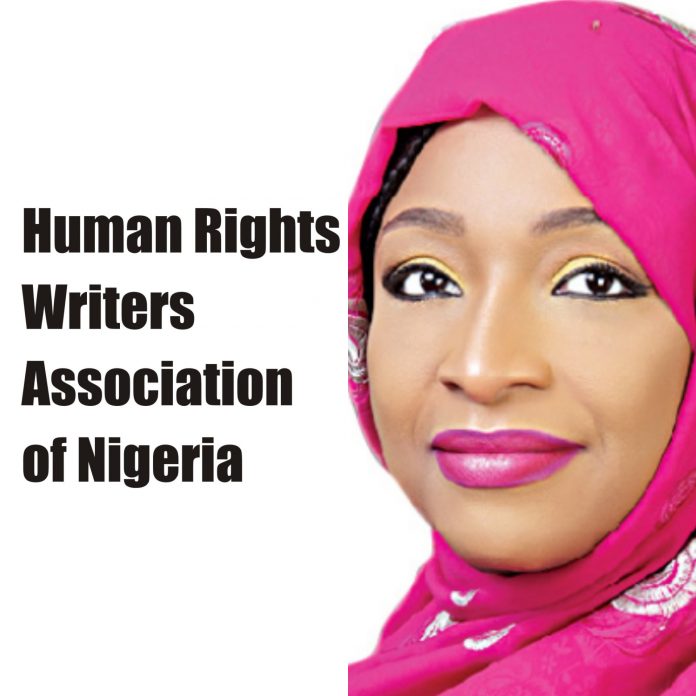HURIWA, Minister of Art, Culture and Creative Economy, Ms. Hannatu Musawa.
By Our Reporter
Human Rights Writers Association of Nigeria (HURIWA), has alleged that there is an orchestrated manoeuvre by the Presidency for a soft landing over the controversy surrounding Minister of Art, Culture and Creative Economy, Ms. Hannatu Musawa.
Musawa, who is presently a serving member of the National Youth Service Corps (NYSC) has been at the center of a storm since HURIWA exposed her status thereby raised questions regarding her eligibility and transparency in public office.
A statement on Monday, August 28, 2023 by the National Coordinator of HURIWA, Comrade Emmanuel Onwubiko, disclosed that a potentially strategic plan by the government was in the offing.
Quoting a reliable sources, HURIWA said that there are indications that the Presidency is considering a strategic reshuffle to allow the positioning of Musawa to head the Ministry of Youth Development which oversees the National Youth Service Corps (NYSC).
HURIWA said that the move has raised eyebrows and prompted concerns about the transparency and accountability in governance.
According to HURIWA; “The core of the unfolding saga revolves around Minister Hannatu Musawa’s alleged inability to furnish conclusive evidence of her completion of the mandatory National Youth Service program during her Senate confirmation, stressing that there are potential contradictions in statements made by various stakeholders.
HURIWA further said; “A prominent concern is the disparity between Minister Musawa’s assertion of having successfully concluded her service and the National Youth Service Corps (NYSC) counter-claim that she is currently engaged in active service.
“This discrepancy if substantiated, further intensifies the ongoing controversy, because NYSC had officially confirmed that she is serving now and has served for eight months out of twelve months.
“The matter of Minister Musawa’s eligibility for public office has not only ignited a national discourse but also raised legal concerns regarding adherence to the Nigerian Constitution and the NYSC Act.
“While acknowledging Minister Musawa’s apparent dedication to both her national service and her ministerial responsibilities, a pivotal question emerges: Do her concurrent roles align with the established legal framework as outlined in the NYSC Act and the Nigerian Constitution? “The unprecedented nature of this situation in Nigeria’s history adds complexity to the matter. The NYSC Act, designed to foster national unity and involve young citizens in the nation’s progress, explicitly outlines participation requirements. Section 2 mandates that all citizens under 30 years of age who have graduated from tertiary institutions, both within and outside Nigeria, must fulfill a mandatory one-year national youth service. Notably, Section 13 of the Act stipulates penalties for non-compliance.
“Furthermore, the Nigerian Constitution specifies qualifications and disqualifications for public office. Specifically, Section 147(6) states that a person cannot be appointed a Minister of the Federation unless eligible for election as a member of the House of Representatives. This connection between the criteria for ministerial appointments and legislative roles raises pertinent questions.”
“This discrepancy has led to substantial legal discussions about the feasibility of simultaneously occupying the roles of a serving corps member and a minister. Notable constitutional experts have questioned the compatibility of these dual roles and the potential precedents they might set. Femi Falana (SAN), a prominent legal scholar, contended that an active corps member may lack the necessary competency for political or governmental positions that require trust and public service.
“In a statement titled: ‘A Youth Corps Member is not competent to be a Minister in Nigeria’, Falana said that a person who is disqualified by law to be a lawmaker is also disqualified to be appointed as a minister. The Constitution appears to have set the same qualifications and disqualifications for the two offices. Specifically, section 147(6) of the Constitution provides that no person shall be appointed as a Minister of the Government of the Federation unless he is qualified for election as a member of the House of Representatives.
“Continuing, Falana emphasized that a person who did not participate in the national youth service is not qualified to be a member of the House of Representatives In the same vein, a person who has not completed the compulsory one-year youth service is not competent to be appointed a Minister in Nigeria since the Constitution has prescribed the same qualifications and disqualifications for election into the House of Representatives and appointment into the post of a Minister”.
Given the legal complexities at play, HURIWA reiterated its call for an exhaustive, impartial investigation into the legality of Minister Musawa’s dual roles. The organization underscored the critical need to uphold the principles of the law, transparency, and accountability to safeguard the integrity of public office and the governance process.
The rights organisation also expressed concerns about potential transparency violations if Minister Musawa had failed to disclose her ongoing NYSC service during her ministerial screening.
HURIWA therefore called on the embattled Musawa to quit one of the National services, adding that a transparent, and independent investigation remains steadfast.
It stressed that the outcomes of an inquiry would shed light on the legality of dual roles and the potential implication for Nigeria’s democratic principles and governance integrity.


